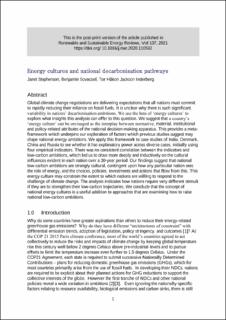| dc.contributor.author | Stephenson, Janet | |
| dc.contributor.author | Sovacool, Benjamin K. | |
| dc.contributor.author | Jackson Inderberg, Tor Håkon | |
| dc.date.accessioned | 2021-07-28T07:20:23Z | |
| dc.date.available | 2021-07-28T07:20:23Z | |
| dc.date.created | 2020-12-09T09:26:07Z | |
| dc.date.issued | 2021 | |
| dc.identifier.issn | 1364-0321 | |
| dc.identifier.uri | https://hdl.handle.net/11250/2765436 | |
| dc.description.abstract | Global climate change negotiations are delivering expectations that all nations must commit to rapidly reducing their reliance on fossil fuels. It is unclear why there is such significant variability in nations’ decarbonisation ambitions. We use the lens of ‘energy cultures’ to explore what insights this analysis can offer to this question. We suggest that a country’s ‘energy culture’ can be envisaged as the interplay between normative, material, institutional and policy-related attributes of the national decision-making apparatus. This provides a meta-framework which underpins our exploration of factors which previous studies suggest may shape national energy ambitions. We apply this framework to case studies of India, Denmark, China and Russia to see whether it has explanatory power across diverse cases, initially using four empirical indicators. There was no consistent correlation between the indicators and low-carbon ambitions, which led us to draw more deeply and inductively on the cultural influences evident in each nation over a 30-year period. Our findings suggest that national low-carbon ambitions are strongly cultural, contingent upon how any particular nation sees the role of energy, and the choices, policies, investments and actions that flow from this. This energy culture may constrain the extent to which nations are willing to respond to the challenge of climate change. The analysis indicates how nations require very different stimuli if they are to strengthen their low-carbon trajectories. We conclude that the concept of national energy cultures is a useful addition to approaches that are examining how to raise national low-carbon ambitions. | |
| dc.language.iso | eng | en_US |
| dc.title | Energy cultures and national decarbonisation pathways | en_US |
| dc.type | Peer reviewed | en_US |
| dc.type | Journal article | en_US |
| dc.description.version | acceptedVersion | |
| dc.source.volume | 137 | en_US |
| dc.source.journal | Renewable & Sustainable Energy Reviews | en_US |
| dc.identifier.doi | https://doi.org/10.1016/j.rser.2020.110592 | |
| dc.identifier.cristin | 1857762 | |
| dc.relation.project | Norges forskningsråd: 295704 | |
| dc.relation.project | Fridtjof Nansens institutt: 481 | |
| dc.relation.project | Fridtjof Nansens institutt: 477 | |
| dc.relation.project | Norges forskningsråd: 295062 | |
| cristin.ispublished | true | |
| cristin.fulltext | postprint | |
| cristin.qualitycode | 1 | |
